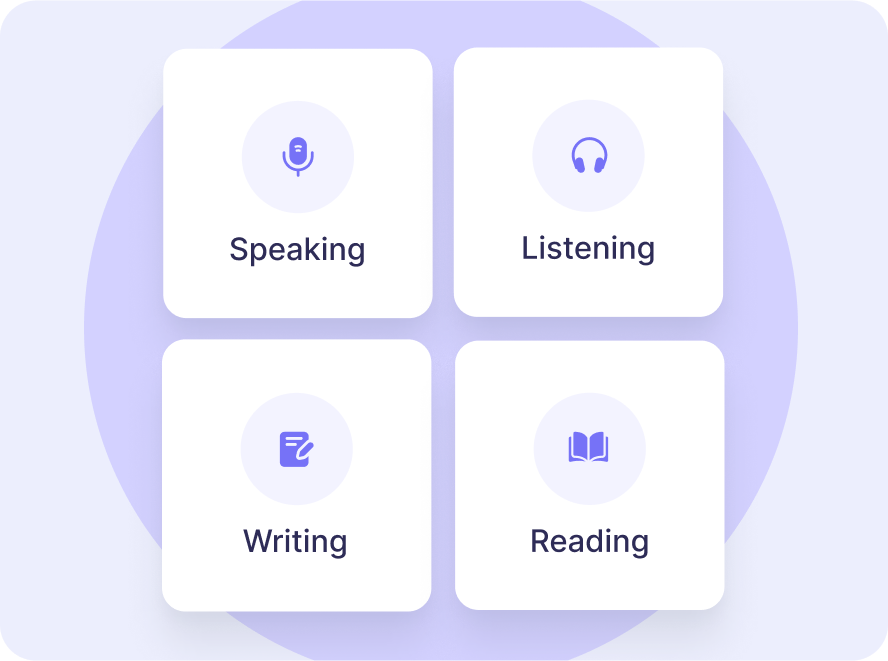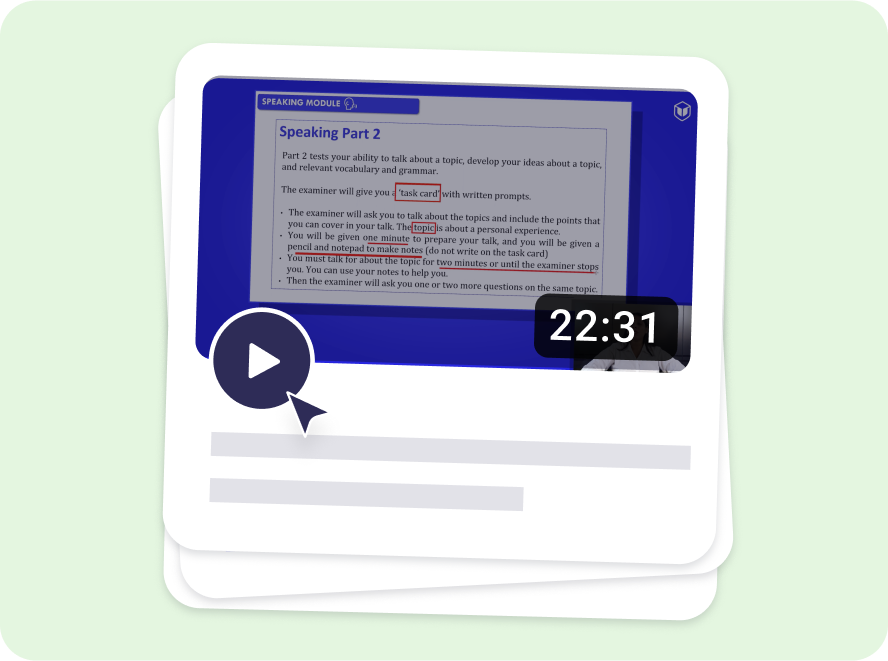4-Week IELTS Course with Band Jump Guarantee
4-Week IELTS Course with
Band Jump Guarantee
Daily Live Classes
Certified IELTS Trainers
Practice 100+ IELTS Mock Tests



Why choose Leap for your
IELTS Preparation




Attend Free Masterclass with
India’s Top IELTS Instructors

Struggling with IELTS preparation? Get trained by 20+ experienced IELTS experts who have helped thousands of students prepare for IELTS and achieve Band 7+ in their IELTS exam preparation.
Our IELTS coaching classes focus on small batch sizes ensuring that every student gets personalised attention. Our trainers help students with IELTS Writing, Speaking, Listening, or Reading and provide one-on-one doubt-solving sessions to strengthen your weak areas.
We offer:
- Live IELTS online classes with interactive learning
- IELTS coaching online free demo sessions
- IELTS online training with AI-driven practice tests
- IELTS preparation online free study materials
Our structured IELTS course ensures a guaranteed improvement in your IELTS band score. Our IELTS online coaching classes let you learn from anywhere, so stop looking for IELTS classes near you.
Join the best online coaching for IELTS and get closer to your dream score today!

Veronica Victoria
10+
Years of experience
2400+
Students helped

Ruchika Joshi
12+
Years of experience
3000+
Students helped

Pew Mukherjee
7+
Years of experience
1200+
Students helped

Sana Hamza
10+
Years of experience
2000+
Students helped

Prabhjeet Singh
13+
Years of experience
3500+
Students helped

Veronica Victoria
10+
Years of experience
2400+
Students helped

Ruchika Joshi
12+
Years of experience
3000+
Students helped

Pew Mukherjee
7+
Years of experience
1200+
Students helped

Sana Hamza
10+
Years of experience
2000+
Students helped

Prabhjeet Singh
13+
Years of experience
3500+
Students helped


We’ve helped 5000+
people score 8+ bands

Your IELTS preparation matters and nothing speaks louder than results. Here’s a glimpse of real IELTS scorecards from students who enrolled in our IELTS online course and coaching programs.
Thousands of students have successfully prepared for IELTS and achieved a 7+ IELTS band score by enrolling in either our expert-led IELTS masterclass or our self-paced LIY program.
- First-time test takers excelled with our IELTS coaching classes and thus gained the skills required to score Band 7+.
- Students appearing for a one skill retake improved their performance with our IELTS online training and focused practice IELTS mock tests.
- Weekend learners were able to balance their schedules while making consistent progress through IELTS online classes.
- Self-prep students used our IELTS practice test online resources for FREE to sharpen their skills and track progress.
From IELTS general training to IELTS academic coaching - our programs cater to all learners. Our IELTS online coaching delivers expert guidance—no matter where you are and is better than any IELTS coaching centre near you.
Explore our students' IELTS scorecards below and take the next step toward your own success!



Explore IELTS
Preparation Material

Your IELTS preparation isn’t complete without the right practice. Our expert-designed IELTS mock tests help you sharpen your skills and achieve 7+ bands. These preparation materials are designed to cover all types of students whether you’re just starting, retaking the exam, or enrolled in an offline IELTS coaching class near you.
Get Your Band Score in 10 Minutes – Free IELTS Test
Not sure where you stand? Take our free IELTS practice test online and get an estimated band score within minutes. This is perfect for:
- Students deciding whether to enrol in IELTS coaching.
- Test-takers who scored low and need IELTS online training for improvement.
- Anyone looking to practice before booking their actual IELTS exam.
Why Our IELTS Mock Tests Stand Out?
- Designed by Experts - Each question is carefully selected by our in-house instructors from official sources, IELTS preparation books, and real student experiences to ensure comprehensive exam coverage.
- Covers all modules - Our tests prepare you for all sections: Listening, Reading, Writing, and Speaking as well as for both IELTS General Training or IELTS Academic.
- Real Exam Experience - Timed tests simulating actual IELTS conditions and helping you manage time effectively.
Self-Paced Learning with Free Study Materials
Want to prepare for IELTS at home? Access our IELTS preparation online free resources, including:
- Free IELTS course with video lessons and expert strategies
- Downloadable IELTS exam preparation books & PDFs
- Module-wise practice, including IELTS General Training Reading Practice Test PDFs with Answers
- Tips for IELTS Speaking, Writing, Listening & Reading Preparation
These resources are more than just Mock Tests; it is The Complete IELTS Prep Solution.
🎯 Looking for the best online IELTS coaching? Our IELTS online course offers structured lessons, practice tests, and AI-based feedback - all at a price lower than competitors.
Start your IELTS journey today with a free test and expert study materials! 🚀
IELTS Mock Tests

-
100+ Mock Tests
-
Instant Band Prediction
-
Complete Teacher Feedback
IELTS Resources

-
Complete Study Material
-
20+ hrs Video Lectures
-
Downloadable PDFs


Frequently asked Questions

Q. How to prepare for IELTS online?

Ans. You can prepare for IELTS online for free by using official resources, practice tests, and study materials available on various platforms. Leap Scholar’s IELTS Masterclass provides expert guidance, strategies, and tips to boost your score. Additionally, Leap IELTS LIY offers a structured learning approach, and interactive sessions, helping you practice effectively and improve your skills for a high band score.
Q. Can I prepare for IELTS by myself?

Ans. Yes, you can prepare for IELTS by yourself with the right resources and study plan. Use Leap Scholar's IELTS masterclass, take practice tests, and improve your skills in listening, reading, writing, and speaking. Online courses, tailor-made tutorials, and IELTS preparation books can help. Leap Scholar also offers LIY for students who want to prepare at home and get the desired band score. However, expert guidance can be beneficial for personalised feedback and improvement.
Q. How many attempts are allowed for IELTS?

Ans. There is no limit to the number of times you can take the IELTS exam. You can retake it as many times as needed to achieve your desired score. However, it’s advisable to prepare well before each attempt to improve your performance and avoid unnecessary expenses, as the full IELTS exam is INR 17,000, and if you take a re-exam for one module known as one skill retake exam it will cost the same. So prepare well before taking the IELTS exam as expert guidance can be beneficial for personalised feedback and improvement.
Q. How much does IELTS cost in India?

Ans. The IELTS exam fee in India varies but is generally around ₹17,000 for both IELTS Academic and General Training. Additional charges apply for rescheduling or revaluation.
Q. What are the 4 subjects in IELTS?

Ans. The IELTS exam consists of four sections: Listening, Reading, Writing, and Speaking. Each section assesses different language skills, and the overall band score is based on the average performance across all four sections.
Q. Can I pass IELTS on the first attempt?

Ans. Yes, many candidates pass IELTS on their first attempt with proper preparation. A strong grasp of English, regular practice, and familiarity with the test format can significantly improve your chances of achieving your target IELTS band score. Leap Scholar has helped around 1,20,500+ students get the 7+ band score and get into their dream universities for higher education.
Q. Is IELTS very difficult?

Ans. IELTS difficulty varies based on your English proficiency. With regular practice, strategic preparation, and an understanding of the test format, you can achieve a good score. The test assesses real-world language skills like IELTS vocabulary for each section, and sentence creation rather than advanced grammar. Check your IELTS score in 5 minutes and decide how to start preparing for the IELTS exam.
Q. Can I prepare for IELTS in 1 month?

Ans. Yes, one month is enough for IELTS preparation if you follow a structured study plan. Focus on improving your weaknesses, practice all four sections daily, take mock tests, and familiarise yourself with test strategies.
Q. Which course is best for IELTS?

Ans. The best IELTS course depends on your needs. Leap Scholar provides personalised structured coaching or self-study with mock tests, preparation materials, LIY and masterclass for students who desire to get high band scores and get admitted to their desired universities.
Q. Is it worth taking IELTS coaching?

Ans. IELTS coaching can be beneficial if you need structured guidance, personalised feedback, and test strategies. However, self-study with proper resources like IELTS reading practice tests, speaking cue cards, writing task 1, writing task 2, and listening practice tests can also help you achieve a high score if you are disciplined.
Q. Is IELTS 7.0 easy?

Ans. IELTS 7.0 is achievable with good English proficiency and dedicated practice. It requires a strong vocabulary, accurate grammar, and effective time management across all four sections of the test.
Q. How to crack the IELTS reading?

Ans. To excel in IELTS Reading, practice skimming and scanning techniques, improve vocabulary, and take timed IELTS mock tests. Focus on understanding question types and managing time efficiently during the exam.
Q. Which is the best IELTS mock test online?

Ans. The best IELTS mock tests are available on Leap Scholar as we provide structured personalised mock tests, where students can practice the section where they feel the need to practice a bit more with our LIY and Masterclass. These offer realistic test simulations and valuable feedback.
Q. Can I take the IELTS mock test online?

Ans. Yes, you can take IELTS mock tests online through Leap Scholar as there are structured personalised mock tests, where students can practice the section where they feel the need to practice a bit more with our LIY and IELTS Masterclass. These tests help assess your readiness and improve time management.
Q. What is a good IELTS score?

Ans. A good IELTS band score depends on your goal. A band 7.0+ is ideal for universities, while 6.0–6.5 is acceptable for immigration and work. Higher scores improve opportunities.

















